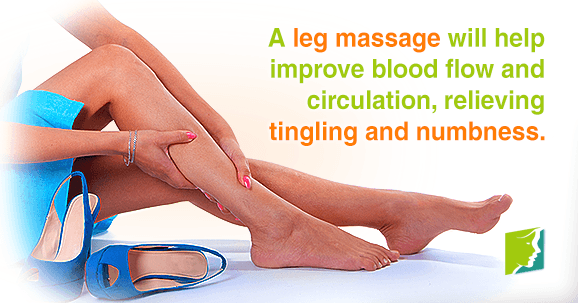One of the lesser-known symptoms of menopause is tingling and numb legs. Although rarely a serious problem, it can be an annoying and frustrating symptom to suffer from. Fortunately, there are things that you can do in order to prevent it from occurring. Keep reading to discover the top five tips for relieving menopausal tingling and numb legs.
Massages
Massaging your legs will help improve the blood flow and circulation. This can help you to stop feelings of tingling and numbness. Treat yourself to a professional massage, but also bear in mind that a daily self-massage can also greatly improve the symptom.
Sit Correctly
Make sure that you maintain a good posture when sitting down. Try and avoid crossing your legs, or sitting on your feet. Both of these positions can lead to trapped nerves, and can prevent blood from reaching your legs and feet, triggering tingling and numbness. If you work in a job that requires you to be seated for the majority of the time, try and get into the habit of getting up and walking around at regular intervals.
Wear Compression Socks
Compression socks help to stimulate blood circulation, reducing chances of you developing tingling or numbness in your legs.These are especially helpful if you have to sit still, or in a cramped space, for a long period of time.
Maintain a Healthy Weight
Maintaining a healthy weight can have an enormous impact not just on relieving tingling legs, but also on improving your overall health. The best way to maintain a healthy weight is by exercising for at least 30 minutes, three times a week, and by keeping to a healthy diet. Include plenty of fruit and vegetables, and try to keep a good balance between carbohydrates and protein. Meanwhile, avoid processed or convenience foods and refined sugars.
Balance Your Hormones
The best tip for relieving tingling and numb legs during menopause is to tackle the root of the problem, which is most often related to imbalanced hormones. Estrogen has a heavy impact upon the central nervous system, and therefore any disruption of estrogen levels can cause tingling or numb legs. Alternatively, using the right supplements can help you to nourish the hormonal system as a whole and help to restore balance, and in doing so, ease the symptoms of menopause.
Tingling and numb legs can be experienced at any stage of life, but it can become particularly prominent during menopause. By making changes to your lifestyle, and getting into good habits, the symptoms can be reduced in frequency and intensity. Using supplements can also help you to get to the base of the problem, and relieve menopausal tingling.
Sources
- Australian Physiotherapy Association. (2013). Pins and needles: Better Health. Retrieved September 12, 2013 from http://www.betterhealth.vic.gov.au/bhcv2/bhcarticles.nsf/pages/Pins_and_needles


